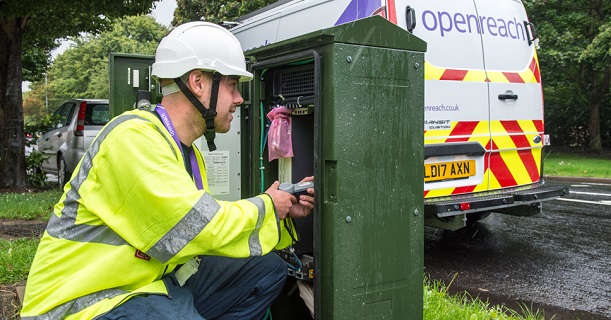The UK regulator says its proposed new framework will improve the business case for fibre investment and protect customers from high prices.
Ofcom says, “In 2017, we set out a range of pro-investment measures that kickstarted full fibre rollout by a range of broadband companies. Since then, full fibre coverage has trebled.”
Next year, the regulator plans to vary its regulation for different parts of the country, which – combined with the Government’s planned £5 billion funding for rural areas – will help ensure nobody gets left behind, according to Ofcom.
The new proposals are part of Ofcom’s review of wholesale telecoms used for residential and business services in the UK.
This maps out how Ofcom will regulate BT for the period from April 2021 to March 2026.
In the review it proposes:
• to improve the business case for fibre investment for all parties by setting Openreach’s prices in urban areas to encourage competition from alternative network providers and investment from Openreach to ensure all parties can make a fair return. Openreach is BT’s wholesale infrastructure unit.
In these areas, it proposes that Openreach’s wholesale price charges to retail providers for its entry-level (40 Mbit/s) superfast broadband service is capped to inflation. Already in its 2018 review, Ofcom reduced what Openreach could charge for this, but points out the costs associated with fibre build-out are falling.
• to protect customers and drive competition by ensuring people can access affordable broadband by capping Openreach’s wholesale charges on its slower copper broadband services. To prevent Openreach from harming competition, it would be restricted from being able to offer discounts that could stifle investment by its rivals.
• to act in more sparsely-populated rural areas, where there is no prospect of multiple networks being built, by supporting investment by Openreach – the only operator with a large-scale rural network.
It plans to allow Openreach to recover investment costs across the wholesale prices of a wider range of services, reducing the investment risk. If BT provides a firm commits to build fibre in these parts of the country, Ofcom will include these costs in its prices upfront. If not, the regulator will only allow it to recover these costs after it lays new fibre.
Also, the UK Government is planning to invest £5 billion to reach the most challenging 20% of the UK and Ofcom says it is working closely with Government on its plans.
• to smooth the path to Openreach closing down its aged copper network, and so avoid the expense of running two infrastructures. The regulator plans to remove regulation on Openreach’s copper products in areas where full fibre is built so customers can be switched to fibre. Ofcom proposes to protect customers during this transition, by transferring regulation – including price protections – from copper to new fibre services.
5G regulation
Ofcom also set out how it intends to regulate Openreach’s ‘leased lines’ – the high-speed connections used by large organisations and the UK’s mobile and broadband networks – its previous proposals attracted considerable criticism and led to Vodafone and TalkTalk lodging an appeal with the Competition Appeal Tribunal in August.
It plans to vary its regulation depending on the level of current or potential competition in a given area.
This would involve Openreach having to provide companies with access to its ‘dark fibre’ – cables that are ‘lit’ by competitors – in non-competitive areas, at a price that reflects its costs. This would significantly reduce the cost for mobile operators to roll out their new 5G networks.
Openreach said in a statement to the press that the “proposal appears to be a big step in the right direction to give clarity and investment certainty”.
The new consultation closes on 1 April 2020, and it will publish its decisions in early 2021 before the current rules expire in April 2021.


